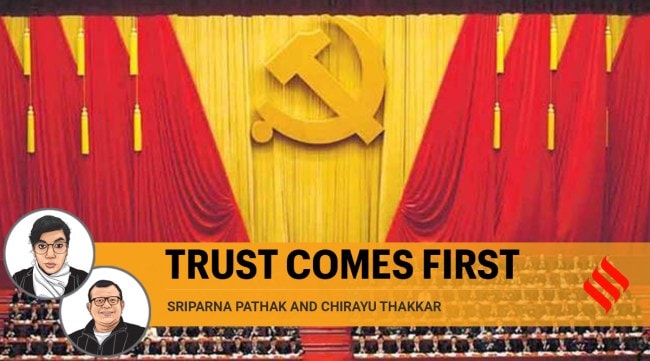Opinion Before talking cooperation, China needs to stop aggression against India
If Beijing wishes to work together for global growth, now is the time to opt for a psychological makeover and dial down border tensions
 Siparna Pathak and Chirayu Thakkar write: If Beijing means business, it should undergo a psychological makeover and inject a dose of pragmatism into its South Asia policy.
Siparna Pathak and Chirayu Thakkar write: If Beijing means business, it should undergo a psychological makeover and inject a dose of pragmatism into its South Asia policy. Recently, China’s top diplomat to India, Ma Jia, wrote that China and India can work together towards the recovery and growth of the world economy (‘A Focus on Common Interests’, IE June 2). It’s surprising that while the Chinese state-run Global Times churns out pieces critical of India day in and day out, an in situ top diplomat chose to write this. There is a noticeable pattern here. Whenever there are summits, where both India and China are participants — the BRICS meet for instance — we see such platitudes. The Indian establishment will be least enamoured by such statements. India’s foreign minister S Jaishankar has admitted that ties between both nations are not normal on more than one occasion.
Let us assume that Beijing indeed desires to work with India. The dissonance between this desire and China’s actions is vast. If Beijing means business, it should undergo a psychological makeover and inject a dose of pragmatism into its South Asia policy. Without such concrete steps, no amount of words will placate policy planners in New Delhi. Before both giants can think of driving global growth, they need to mend ties, and the onus lies squarely with Beijing. We suggest three things.
Indians feel that China’s India policy is driven by dogmas such as the Middle Kingdom and unipolar Asia. Indian archives indicate that since the 1962 Sino-Indian war, Sinophiles within the Indian establishment — T N Kaul, V V Paranjape, Jagat Mehta, K R Narayanan, among others— have held the view that China’s frontier aggression is driven by Beijing’s desire to cut India to size in Asia and the developing world. However, China’s dream of a unipolar Asia will never materialise. If Japan was a counterweight in the past, India is the counterweight of the future. Recent macroeconomic forecasts suggest that a mighty India is here to stay. China, which has built a foreign policy narrative on the basis of a lack of respect from the West, should know more than all others the need to treat everyone with respect, especially a rising power like India. Acknowledging India as an indispensable Asian and global power in the days to come is a starting point for any future cooperation.
Accompanying this psychological makeover, certain good faith measures are needed. Calming the borders and ceasing to undermine India’s relationship with its neighbours in South Asia is essential. Maintaining peace at the borders is the first step towards cooperation. When soldiers cross borders, goods do not, and vice versa. The onus is on China since India and Bhutan remain the only two countries in the world with which China has not settled its land border disputes. Moreover, there is no strategic logic for the uninhabitable high grounds that China is trying to capture. The sheer cost is a working relationship with an Asian giant. Every step China takes to push India into the corner actually pushes India into the West’s military lap, exacerbating China’s security dilemma with a deepening Indo-US alliance.
India has had more hesitation with the West than it has with China today. However, China’s belligerence is creating a new set of hesitations eastwards. When India joined the RCEP (Regional Comprehensive Economic Partnership) negotiations in 2012 and became the second-biggest stakeholder in the China-led Asian Infrastructure Investment Bank (AIIB) in 2014, it was in awe of Asian multilateralism and believed there was space for two, or perhaps more, in Asia. New Delhi’s later refusals for the RCEP only show increasing disenchantment with ideas built on promises of cooperation. The clashes in Galwan changed things forever. Perhaps it was a calculated strategy on the part of Beijing. But with those skirmishes, China has crossed the Rubicon. Cooperation hardly has any space in the new equilibrium.
Boiling tensions on the border may keep India in check for a while, but it is not going to prevent India’s rise. If Beijing wishes to work together for global growth as Ma Jia wants Indians to believe, now is the time to opt for a psychological makeover and dial down border tensions. India is moving westwards faster, and perhaps, the window of working together may not remain open forever.
Pathak is Associate Professor of China Studies at O P Jindal Global University and the director of the Northeast Asian Center. Thakkar is a doctoral candidate jointly with the National University of Singapore and King’s College London






